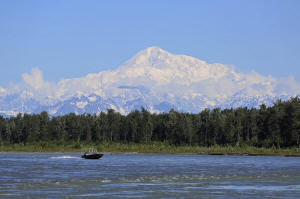Alaskans say Trump can change the name of Denali but can't make people
call it Mount McKinley
 Send a link to a friend
Send a link to a friend
 [January 27, 2025]
By MARK THIESSEN [January 27, 2025]
By MARK THIESSEN
ANCHORAGE, Alaska (AP) — North America’s tallest peak is a focal point
of Jeff King’s life.
The four-time winner of the 1,000-mile (1,609-kilometer) Iditarod Trail
Sled Dog Race operates his kennel and mushing tourism business just 8
miles (12.87 kilometers) from Denali National Park and Preserve’s
entrance, and the 20,310-foot (6,190-meter) mountain looms large as he
trains his dogs on nearby trails.
King and many others who live in the mountain’s shadow say most Alaskans
will never stop calling the peak Denali, its Alaska Native name, despite
President Donald Trump’s executive order that the name revert to Mount
McKinley -- an identifier inspired by President William McKinley, who
was from Ohio and never set foot in Alaska.
For many who live near Denali, Trump’s suggestion was peculiar.
“I don’t know a single person that likes the idea, and we’re pretty
vocal about it,” King said. “Denali respects the Indigenous people that
have been here and around Denali for tens of thousands of years.”
The mountain was named after McKinley when a prospector walked out of
the Alaska wilderness in 1896, and the first news he heard was that the
Republican had been nominated for president.
The name was quickly challenged, but maps had already been circulated
with the mountain’s name in place.
At the time, there was no recognition of the name Denali, or “the high
one,” bestowed on the mountain in interior Alaska by Athabascan tribal
members, who have lived in the region for centuries.

The McKinley name stuck until 2015, when President Barack Obama’s
administration changed it to Denali as a symbolic gesture to Alaska
Natives on the eve of his Alaska visit to highlight climate change.
Trump said he issued the order to “restore the name of a great
president, William McKinley, to Mount McKinley, where it should be and
where it belongs. President McKinley made our country very rich through
tariffs and through talent.”
The area lies solely in the United States, and Trump, as president, has
the authority to change federal geographical names within the country.
In Ohio, Trump's move drew praise.
“I was really excited to see President Trump do that executive order,”
former U.S. Rep. Bob Gibbs, R-Ohio, told The Associated Press by
telephone Thursday. McKinley “was a great president,” Gibbs said. “It
was the appropriate thing to do.”
That's not how Alaskans see it.
Trump injected “a jarring note” into Alaska affairs, Steve Haycox,
professor emeritus of history at the University of Alaska Anchorage,
wrote in the Anchorage Daily News.
“Historical analysis confirms that William McKinley is the wrong public
figure for Alaskans to commemorate,” he said.
McKinley served as president from 1897 until he was assassinated in
1901. He was an imperial colonialist who oversaw the expansion of the
American empire with the occupation of Cuba, Puerto Rico, Guam, the
Philippines and Hawaii, pushed by business interests and Christian
missionaries wanting to convert Indigenous peoples, Haycox said.
“Trump’s push to rescind the name Denali for the colonialist and white
elitist McKinley is insulting to all Alaskans, especially to Alaska’s
Native people, and should be soundly rejected,” Haycox said.
John Wayne Howe, who unsuccessfully ran for U.S. House last year
representing the Alaskan Independence Party, which holds that Alaskans
should be allowed to vote on becoming an independent nation, said he is
tired of "people changing the names of stuff, period.”

He also is not in favor of naming anything after people because “the
persons that we consider absolutely perfect change over time, and it
just leads to confusion.”
Howe said he prefers Denali because he knows McKinley’s history and it’s
the name most preferred by Alaskans.
This past week, two resolutions were introduced in the Alaska
Legislature to keep the name Denali.
[to top of second column]
|

A boat is seen on the Susitna River near Talkeetna, Alaska, on
Sunday, June 13, 2021, with Denali in the background. Denali, the
tallest mountain on the North American continent, is located about
60 miles northwest of Talkeetna. (AP Photo/Mark Thiessen, File)

Republican Gov. Mike Dunleavy, a Trump ally who praised another
order by the president aimed at spurring resource development in the
state, said he had not had a chance to speak with Trump about the
issue but hoped to have a conversation next month in Washington
about what Denali means to Alaskans, Americans and “our Native
folks.”
But Sarah Palin, a former Republican governor who is also a Trump
supporter, said the McKinley name should never have been removed.
Palin’s Secret Service code name was Denali in 2008 when she was GOP
presidential nominee John McCain’s running mate the year they lost
to Obama and Joe Biden.
But in an interview with Al Arabiya News this past week, Palin said
she didn’t see why the mountain’s name needed to be changed to begin
with.
“It’s always been Mount McKinley,” said Palin, who didn’t respond to
a message from The Associated Press. “Nobody was begging for a
change in name in that peak. Just put it back the way it was, more
common sense.”
Alaska’s U.S. senators, Republicans Lisa Murkowski and Dan Sullivan,
have supported the name Denali. U.S. Rep. Nick Begich, a first-term
Republican, sidestepped the debate.
“I’m focused on job creation, opportunities in Alaska,” Begich told
Politico. “And what we call a mountain in Alaska is of little
concern to me.”
The Alaska Native Heritage Center, the statewide Indigenous cultural
center in Anchorage, supports preserving Indigenous place names.
“Restoring and honoring them acknowledges the deep, millennia-old
connection Indigenous peoples maintain with these lands and is a
step toward respect and reconciliation,” the center’s president,
Emily Edenshaw, said in a statement.
The quirky Alaska community of Talkeetna, about 140 miles (225.3
kilometers) south of the park and where a cat was once mayor, is the
jumping off point for climbers before making the ascent of the peak.
The historic community long rumored to be the inspiration for the
1990s television series “Northern Exposure” is also a popular
tourist stop.

Joe McAneney of Talkeetna worked as a summer raft-guide for two
years before moving to Alaska full time in 2012. He’s now a pilot
for an air taxi company, ferrying climbers and tourists to the
mountain in a small airplane outfitted with skis to land at base
camp, located on Kahiltna Glacier at 7,200 feet (2,194.6 meters)
above sea level.
He knows once tourist season comes around, he will have to answer
their questions of what he thinks about Trump changing the name. He
knows what his answer will be.
“It’s always been Denali, and it always will be,” he said.
The executive order can instigate the name change, but compliance is
another issue.
“The only people that are going to adhere to that are probably the
people that would have been still calling it McKinley anyway,”
McAneney said
There is a long-standing Alaska trait of ignoring what the rest of
the world thinks, and it's usually expressed like this: “We don’t
care how they do it Outside.” Outside, which is always capitalized,
refers to every place that is not Alaska.
“I think unofficially and officially in Alaska, it’ll always be
Denali,” McAneney said. “I don’t think the president can change
that.”
For King, the decorated Iditarod musher and fan favorite, Trump's
decision had a whiff of arrogance.
“I’m surprised he doesn’t want to name it Trump Mountain,” he said.
___
Associated Press writer Becky Bohrer in Juneau, Alaska, contributed
to this report.
All contents © copyright 2025 Associated Press. All rights reserved |